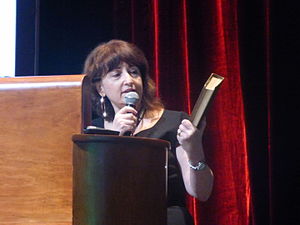Wikipedia:Wikipedia Signpost/2016-12-22/In the media
Appearance
In the media
Coverage of gender gap initiatives, banner fundraising, and more
In brief
- Fundraising approach critiqued: An Inc. article, Wikipedia's New Email Campaign Is a Master Class in Emotional Intelligence, speculated about the thinking behind Wikimedia's 2016 fundraising banners, hitting on many of the same themes recently discussed by the fundraising team itself. (November 30).
- A wiki woman partners with 100 Women: Rosie Stephenson-Goodknight penned an op-ed for the BBC, How I tackle Wiki gender gap one article at a time, which announced an effort by the BBC's "100 Women" initiative to engage with Wikipedia. Along with Keilana, Stephenson-Goodknight won the most recent Wikipedian of the Year award; she is also the Signpost's human resources coordinator. (December 7)
- These five women should be on Wikipedia ... shouldn't they? A BBC piece accompanying Stephenson-Goodknight's proposed BBC's Five women who aren’t on Wikipedia but should be. Biographies on four of the five have since been posted. One was nominated for deletion, with the nominator conceding that her campaign was "laudable", but suggesting that it fell short of Wikipedia's notability standards. Following a discussion, the article was kept. (Precise date unknown.)
- Gender Gap: Laura Bates of The Guardian published a column on December 9 highlighting the gender gap issues frequently covered on Wikipedia, Where are all the women, Wikipedia?
- Not every language Wikipedia is equal: The "Wikiwhere" project which tracks where the references in an article come from was highlighted in the press, including in The New Scientist: Wikipedia 'facts' depend on which language you read them in (December 13); The Daily Mail: Wikipedia 'facts' change depending on where you live (December 14)
- Will Wikipedia honour Jimbo's promise to STOP chugging? Andrew Orlowski opined on the WMF fundraising campaign in the Register, quoting former Signpost editor Andreas Kolbe. (December 16)
- Wikipedia Wunderkind: The Pittsburgh Post-Gazette published Wikipedia Wunderkind: Barbara Page helps readers of the online encyclopedia understand women’s health, among other topics, covering the efforts of University of Pittsburgh visiting scholar Bfpage. (December 15)




Discuss this story
If at some point, if 17% of Wikipedia profiles become male, can we point to these articles, and these article authors, as sexist? Either these accusations of sexism are wrong, or this is one giant page of sexism.
Be wary of conflating gender discrimination, as these articles are clearly doing, and sexism. And be wary of claiming that affirmative action for males, or females, is not gender discrimination. int21h (talk · contribs · email) 15:24, 26 December 2016 (UTC)[reply]